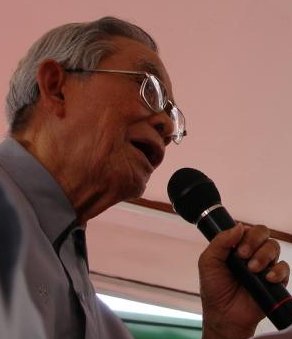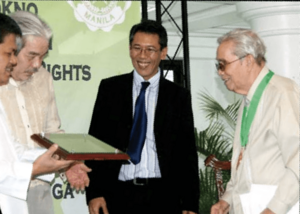Jovito Salonga facts for kids
Quick facts for kids
Jovito Salonga
KGCR
|
|
|---|---|

Salonga in 2005
|
|
| 12th President of the Senate of the Philippines | |
| In office July 27, 1987 – January 18, 1992 |
|
| Preceded by | Abolished (Title last held by Gil Puyat) |
| Succeeded by | Neptali A. Gonzales, Sr. |
| 1st Chairman of the Presidential Commission on Good Government | |
| In office February 28, 1986 – March 5, 1987 |
|
| President | Corazon Aquino |
| Succeeded by | Ramon A. Diaz |
| Senator of the Philippines | |
| In office June 30, 1987 – June 30, 1992 |
|
| In office December 30, 1965 – September 23, 1972 |
|
| Member of the Philippine House of Representatives from Rizal's 2nd district | |
| In office December 30, 1961 – December 30, 1965 |
|
| Preceded by | Francisco S. Sumulong |
| Succeeded by | Frisco F. San Juan |
| Personal details | |
| Born |
Jovito Reyes Salonga
June 22, 1920 Pasig, Rizal, Philippine Islands |
| Died | March 10, 2016 (aged 95) Quezon City, Philippines |
| Nationality | Filipino |
| Political party | Liberal |
| Spouse |
Lydia Busuego
(m. 1948; |
| Children | 5 |
| Alma mater | University of the Philippines Diliman (LL.B) Harvard University (LL.M) Yale University (JSD) |
| Profession | Politician |
Jovito "Jovy" Reyes Salonga (June 22, 1920 – March 10, 2016) was a famous Filipino politician and lawyer. He was a strong leader against the government of Ferdinand Marcos from 1972 until 1986. Marcos was removed from power during the People Power Revolution. Salonga later became the 14th President of the Senate of the Philippines, serving from 1987 to 1992.
Contents
Early Life and Education
Jovito Salonga was born in Pasig on June 22, 1920. His family was not rich. His father, Esteban Salonga, was a pastor, and his mother, Bernardita Reyes, sold goods in the market. Jovito was the youngest of five brothers. He worked hard to pay for his college and law school studies. He was a proofreader for his oldest brother's publishing company.
He studied at the University of the Philippines College of Law. He took the bar exam in 1944. He and Jose W. Diokno both got the highest scores.
World War II Heroism
After the Japanese invaded in December 1941, Salonga secretly worked against them. In April 1942, Japanese soldiers captured him in Pasig. They treated him harshly. He was moved to different prisons and faced more difficulties. On June 11, 1942, he was sentenced to 15 years of hard labor. He was held at the New Bilibid Prison but was later set free in 1943.
Studying in America
After passing the bar exam, he finished his law degree in the Philippines in 1946. He then won a scholarship to study in the United States. He earned a master's degree from Harvard University. Later, he received a special scholarship to Yale University, where he earned his doctorate degree in 1949. Yale offered him a teaching job, but he chose to return to the Philippines. He wanted to help rebuild his country after the war.
At Yale, he met Jose B. Laurel Jr., who later became his law partner in the Philippines. In February 1948, he married Lydia Busuego in Cambridge, Massachusetts. They had five children.
Salonga returned home to teach and practice law. He wrote several books about law. In 1956, he became the Dean of the Far Eastern University Institute of Law. One of his students, Artemio Panganiban, who later became a top judge, said Salonga was one of the best lawyers in history.
Political Career (1961–1987)
Serving in Congress
In 1960, Diosdado Macapagal, who was then Vice President, asked Salonga to run for Congress. Salonga ran for the second district of Rizal. He worked hard to build support, especially among young people. He spoke about important issues, like how political families often stayed in power. In the November 1961 elections, he won by a large number of votes.
As a congressman, he spoke out against corruption in the government. He led a committee that looked into these issues. He recommended that charges be filed against some government officials.
Becoming a Senator
After one term in Congress, Salonga ran for the Senate in 1965. Even with limited money, he won the most votes, becoming a senator. In 1967, he was the main lawyer for Benigno Aquino Jr. in a legal case. Salonga's legal skills helped Aquino win the case.
Salonga was known for speaking out against the Marcos government. Because of his strong stand, he was called the "Nation's Fiscalizer" in 1968.
He ran for re-election in 1971. On August 21, 1971, he was badly hurt in a bombing at a political rally in Plaza Miranda. Doctors thought he might not survive. But he did, even though his eyesight and hearing were affected. He still had many small pieces of shrapnel in his body. Despite his injuries, he won the senatorial race for the second time.
During Martial Law
In September 1972, Ferdinand Marcos declared martial law. This meant he had special powers and could arrest people without charges. Salonga strongly opposed this. He and his law partners defended many political prisoners for free.
In October 1980, Marcos ordered Salonga's arrest again. He was held without charges. In March 1981, he was allowed to leave for the U.S. for medical reasons. After he left, false accusations were filed against him to prevent him from returning.
Jovito and Lydia Salonga lived in the U.S. Many opposition leaders visited him there, including Ninoy Aquino. Salonga became the acting president of the Liberal Party. He was considered a possible candidate for president against Marcos. Eventually, he and other leaders agreed to support Corazon Aquino as the main candidate. She won the 1986 election.
Return to the Philippines
After Ninoy Aquino was killed in August 1983, Salonga returned to the Philippines on January 21, 1985. He wanted to help unite the groups against Marcos. The Supreme Court later dropped the false charges against him. He was then elected president of the Liberal Party.
PCGG Chairman
After the People Power Revolution, President Corazon Aquino asked Salonga to lead the Presidential Commission on Good Government (PCGG). This group was in charge of finding and getting back money that Marcos and his friends had unfairly taken.
As chairman, Salonga worked hard to get back the money Marcos had hidden in Swiss banks. He also helped get back properties and companies that the government believed were taken unfairly. In 2000, a Swiss court decided that over US$680 million from Marcos should be given back to the Philippine government.
Senate Presidency (1987–1992)
After working with the PCGG for a year, Salonga ran for the Senate again in 1987. For the third time, he won the most votes. His fellow senators respected his long career as a lawyer and human rights defender. They elected him as Senate President.
Important Laws
As Senate President, Salonga wrote three important laws:
- The "Code of Conduct and Ethical Standards for Public Officials and Employees" (R.A. 6713). This law helps make sure government workers act honestly.
- The "Anti-Coup d'état Act" (R.A. 6968). This law makes it illegal to try and take over the government by force.
- The "Anti-Plunder Law" (R.A. 7080). This law punishes people who steal large amounts of public money.
He also helped pass laws like the State Scholarship Law, which helps students get scholarships, and the Magna Carta for Public School Teachers.
Rejecting the U.S. Bases Treaty
In September 1991, Salonga led a group of 12 senators. They voted against a treaty that would have allowed U.S. military bases to stay in the Philippines. This was a very important decision for the country.
End of Senate Presidency
In December 1991, Salonga was removed from his position as Senate President. Some thought he was using his position to help his chances in the 1992 presidential election. He was replaced by Senator Neptali A. Gonzales, Sr..
1992 Presidential Election
Salonga ran for president in 1992 with Aquilino Pimentel Jr. as his running mate. He did not win, finishing sixth, even though many students supported him.
After the Senate
Continued Public Service
After leaving government, Salonga continued to serve the public. He started Kilosbayan (People Action), a group that helps people understand politics and get involved in government. He also helped create the Bantayog ng mga Bayani Foundation (Heroes' Memorial). This group honors Filipinos who fought for freedom during martial law.
He also helped with Bantay Katarungan (Sentinel of Justice). This group watches how justice is handled in the Philippines. Salonga kept giving talks about important issues in society. He taught at several universities.
In 2007, Salonga warned President Gloria Macapagal Arroyo that the elections could be unfair. He said they might be like the elections during the Marcos era.
Senator Joker P. Arroyo once said that Jovito Salonga was a rare person who, through his words, helped shape history.
Books and Awards
Salonga wrote a book called Not by Power or Wealth Alone, which was published in 2007.
He received the Ramon Magsaysay Award for government service in 2007. This award is given to people in Asia who show great integrity and service. He was honored for his "exemplary integrity and substance of his long public career in service to democracy and good government in the Philippines." He also received the Ka Pepe Diokno Human Rights Award in 2010. He was also given the highest rank in the Knights of Rizal, called Knight Grand Cross of Rizal (KGCR).
Final Years and Legacy
Jovito Salonga passed away on March 10, 2016, at the Philippine Heart Center in Quezon City.
Many people remember Salonga as a great statesman. Some called him "the best president we never had." The main building at the Bantayog ng mga Bayani Foundation was renamed the Sen. Jovito R. Salonga Building in his honor. Silliman University's law school also has the Dr. Jovito R. Salonga Center for Law and Development.
Personal Life
Jovito Salonga married Lydia Busuego in 1948. She passed away in 2010 at the age of 88. They had five children: Patricia, Victoria Regina, Ricardo, Esteban Fernando, and Eduardo.
 | Madam C. J. Walker |
 | Janet Emerson Bashen |
 | Annie Turnbo Malone |
 | Maggie L. Walker |


